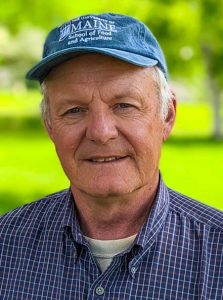
UMaine names 2023 Presidential Award recipients
The 2023 Presidential Awards recognize outstanding teaching in molecular and biomedical sciences, pioneering research in wireless sensor technology, public engagement and research focused on K–12 rural education, and innovation that has advanced Maine’s potato breeding program.
Sally Molloy, associate professor of genomics, received the Presidential Outstanding Teaching Award; Ali Abedi, professor of electrical and computer engineering, received the Presidential Research and Creative Achievement Award; and Catharine Biddle, associate professor of educational leadership, received the Presidential Public Engagement Achievement Award. Gregory Porter, professor of agronomy, is the inaugural recipient of the Presidential Innovation Award.
“Sally is recognized by students and colleagues as an inspirational educator and exceptional leader of one of our first experiential research learning courses that has served as a model for STEM education campuswide and nationwide,” says UMaine President Joan Ferrini-Mundy. “Ali’s internationally recognized research in wireless sensor and artificial intelligence technology has implications for advancing monitoring applications in space, in our forests and in biomedicine. Catharine’s nationally known work in education fosters healthy and equitable youth development and contributes to community building. Greg’s innovation has resulted in five new varieties of Maine potatoes in the past decade, including the popular Caribou Russet, which is good news for the state’s potato industry and consumers.
“The achievements of all of this year’s Presidential Award recipients have an important, lasting effect on the UMaine students they teach and mentor, and exemplify the critical role of Maine’s R1 research university statewide and beyond.”

Molloy has an unparalleled dedication and passion for teaching, and a commitment to transformative educational experiences. Since beginning her teaching career at UMaine in 2007, she has advanced new teaching and learning styles in the Department of Molecular and Biomedical Sciences in the College of Natural Sciences, Forestry, and Agriculture, and in the Honors College. She is recognized nationally for her ability to maximize student learning outcomes, provide exceptional student experiences with her focus on research learning and mindset, and provide a foundation that launches students into impressive postgraduate programs and careers.
The alumna joined the UMaine community in 2000 to pursue a Ph.D. in microbiology. Molloy was a graduate teaching assistant and an instructor in the Department of Biochemistry, Microbiology and Molecular Biology. In 2011, she was instrumental in helping launch the Howard Hughes Medical Institute Science Education Alliance-Phage Hunters Advancing Genomics and Evolutionary Science (SEA-PHAGES) curriculum at UMaine. Over the past 12 years, the experiential research learning course — Genome Discovery I and II — has been transformative for first-year students, preparing them to be involved in research during their undergraduate careers.
From teaching phage genomics to honors civilization courses, Molloy employs an acute understanding of student-centered pedagogies and careful instructional design. Her teaching strategies promote knowledge acquisition, skill development and social-emotional growth in students, who then come to see themselves as scholars and researchers. Her leadership in teaching to improve inclusion and student success also informs her peers and collaborators, contributing to curricula and pedagogies in the UMaine Honors College and nationally in SEA-PHAGES and STEM education initiatives.
In 2019, Molloy received the Faculty Mentor Impact Award. Students she has mentored in her classroom and in the laboratory have gone on to receive competitive research fellowships, awards and scholarships, and be accepted to the nation’s top graduate and medical schools. In her laboratory, where she collaborates with student researchers, her focus is on bacteriophage biology. Last fall, Molloy received a National Institutes of Health grant to investigate the role of prophage-encoded gene products on mycobacterial gene expression and intrinsic antibiotic resistance.

Abedi, an associate vice president for research and director of Center for Undergraduate Research, has a nearly 30-year career in research and teaching. He joined the UMaine community in 2005 and founded the WiSe-Net Lab, dedicated to research on wireless communications and sensor networks for structural monitoring, space exploration and biomedical applications. Student researchers in his lab have gone on to be lead engineers at NASA, SpaceX and top engineering firms.
With a student team, Abedi recently completed building Maine’s first CubeSat, MESAT1, to be launched to polar orbit in 2023. The miniaturized research satellite, funded by NASA and the Maine Space Grant Consortium, will circle Earth for 12 years, providing Maine K–12 and college students, educators and small businesses with access to space data from a ground station in Orono.
His biomedical research has contributed to two patents for a system and method for early detection of mild traumatic brain injury, co-invented with UMaine professor of psychology Marie Hayes. The biomedical device is designed to help patients — from veterans and the elderly to athletes — with Alzheimer’s disease, traumatic brain injury and mild cognitive impairment due to aging.
Abedi and his research teams also have developed and tested wireless sensing instrumentation for air leak detection in NASA’s first inflatable lunar habitat, sited at UMaine. That source localization using acoustic wireless sensor networks resulted in a product that was launched to the International Space Station in 2016. The technology, successfully operated for several months on the space station, was the first product to be launched into space and to use AI and signal processing for air leak detection, localization and signature recognition.
In addition to his wireless sensor research for enabling deep-space missions, Abedi’s cutting-edge technology research and development has implications for environmental monitoring, including the use of artificial intelligence to provide a cost-effective, energy-efficient tool to monitor and manage Maine’s forests.
Abedi is co-founder of two startup companies: Activas-Diagnostics and Nawindor. His extensive publication record includes six books. He is the co-founder of IEEE International Conference on Wireless for Space and Extreme Environments and serves as vice president of the IEEE Council on Radio Frequency Identification.

Biddle joined the UMaine community in 2015. In her work in rural education research, which involves undergraduate and graduate students, she has enhanced school-community relations, helped change K–12 educational paradigms and influenced the focus of rural education research nationwide. In particular, her collaboration in research-practice partnerships results in long-term changes for communities, including improvements in school climate, student attendance and achievement, and the formation of new local coalitions of nonprofits dedicated to addressing these issues.
Biddle collaborated on a Washington County research-practice partnership to address the need to provide services and trauma-responsive education in schools focused on children’s exposure to — and healing from — adverse experiences associated with substance use, poverty and other challenges facing families. She helped to secure $1.5 million in funding to co-design a pilot program, Transforming Rural Experience in Education, in three Washington County elementary schools, from 2017–21.
The jointly designed approach to trauma-responsive practice, which refined the centering of the student voice as a primary vehicle for healing, has since been replicated in multiple school districts nationwide and is the subject of a book, “Trauma Responsive Schooling: Centering Student Voice and Healing,” co-authored with Mark Tappan and Lyn Mikel Brown.
The pilot program led to the formation of the Rural Vitality Lab, a cross-institutional partnership between Colby College and UMaine focused on conducting research to support the development of healthy ecologies for youth in Maine and beyond. Biddle now works in partnership with additional community development groups such as the Midcoast Community Collaborative to address rural vitality, including trauma-responsive practices in support of student success in schools.
In addition, for the past two years, Biddle has worked with a team of researchers in partnership with the National Rural Education Association (NREA) to craft the 2022–2027 National Rural Education Research Agenda. An outcome of this collaboration was an invitation for UMaine to host the New England Rural Education Hub, part of the Rural Schools Collaborative National Hub Network. Biddle directs the New England Rural Education Hub, launched last fall as a national model for rural university-community partnerships. She is a three-time recipient of the NREA Best Research Award.

Porter, a UMaine alumnus, has been a member of the faculty for 38 years and has served as project leader for the university’s Potato Breeding Program since 2007. The program, which involves student researchers at UMaine research facilities in Orono and Presque Isle, creates new potato varieties that provide improved quality and marketing opportunities for growers, while helping to solve pest management problems. It is the only one in the eastern United States with an emphasis on russets and long whites intended for the processing and fresh produce markets.
Creating a successful new potato variety requires 10–12 years. In the past decade, the UMaine Potato Breeding Program, in partnership with the Maine Potato Board, has released five new varieties — Easton, Sebec, Caribou Russet, Pinto Gold and Hamlin Russet — that had the competitive yield and quality attributes necessary to move them from the laboratory to market shelves. Nationally, varieties released by the university and its eastern regional collaborators since 2007 were grown on 8,240 U.S. seed acres during 2022, with an approximate seed value of $28.8 million and potential production value of $267.8 million. During 2022, Caribou Russet at 1,874 seed acres was ranked 12th in the U.S. and its estimated crop value for 2023 is approximately $60 million. Pinto Gold continues to be a favorite for home gardeners, farmers markets, roadside stands and gourmet chefs.
In his research, Porter prioritizes resistance to diseases such as late blight, scab and Potato Virus Y, and uses DNA-based markers to help select potato varieties with resistance to key potato pests. In addition, his work on crop rotations, soil management and supplemental irrigation has helped develop a better understanding of cropping systems that provide high yields and excellent crop quality while protecting and building the soil. Nutrient management research, particularly potassium fertilization, has led to greater understanding of most efficient use while maintaining or improving crop quality in potato production systems.
For the significant impact of his applied research on potato growers and industry leaders in Maine and beyond, Porter has received numerous awards, most recently the Potato Association of America Honorary Life Membership and being named one of the 25 Mainers of the Year by Maine Magazine, both in 2022.
The new Presidential Innovation Award established this year recognizes the university’s mission of advancing learning and discovery through excellence and innovation. It will be an annual award to a UMaine or UMaine Machias faculty member or team that has translated research discoveries and scholarly activity into products or services that have resulted in economic impact and/or significant social and cultural benefit in Maine and beyond.
Contact: Margaret Nagle, nagle@maine.edu
